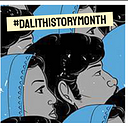Happy Mahatma Phule Jayanthi to all!
Today in #Dalithistory, in honour of Mahatma Phule Jayanthi, we dedicate our post to Jyotirao Phule — an activist, a thinker, and a social revolutionary of the nineteenth century. While he was of Shudra background, his ideas, work and actions have had an invaluable liberatory impact on Dalits.
Born in 1827 before the widespread Adi-movements, Phule was the first to propound caste as subjugation and oppression on indigenous peoples by invaders. He stressed that caste was equivalent to slavery, as vicious and brutal as the enslavement of Africans in the Americas and unique in its deception and religious sanction.
In his revolutionary book, Gulamgiri (Slavery) published in 1873, Jyotirao included a manifesto which amongst other things declared that he was willing to dine with all regardless of their caste, creed or country of origin and that social salvation was to be found only in the education of women and Dalits. This content was deemed extremely controversial at the time and several newspapers blatantly refused to publicize it.
He believed that Shudras were a group of people who had suffered added repression and persecution because they had at one time been actively engaged in fighting invading Brahmanism on the ground. His salvation describes the unity of the Shudras and Adi-Shudras (Dalits) into one exploited mass of people rising up in powerful political unity.
He and his wife, Savitribai Phule, became pioneers of women’s education in India, and together started the first school for girls on January 1st 1848 at Bhide’s wada in Pune. They also started schools in which they educated both girls and “lower” Castes. Like many anti-caste revolutionaries, he felt a strong need to establish an alternative religion to the one that was oppressing his people. What he began then, lead him to form the Satya Shodhak Samaj (Society of Seekers of Truth) whose main objectives were to liberate the Shudras and Adi -Shudras and prevent exploitation by Brahminism within a strong context of gender equality.
His life-long work for equality has recognized when Phule was publicly conferred the title of Mahatma on 11th May 1888 and later even termed the “Martin Luther King of India” by his biographer Dhananjay Keer. Dr.Ambedkar proudly declared that Phule was one of his three spiritual mentors. His birthday continues to be a celebration all around the world where Dalits, Adivasis and Bahujan honour him on Mahatma Phule Jayanthi!
Jai Bhim! Jai Phule!
